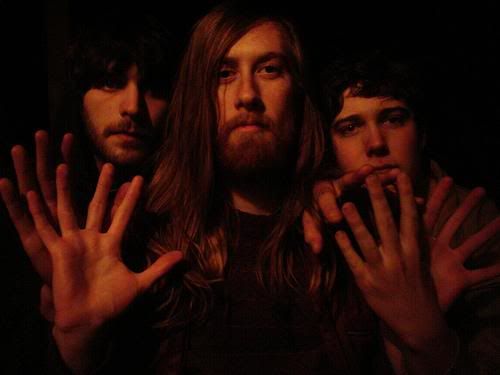
Sometimes taking it outside works best. Ganglians, a beardo four-piece from Sacramento, do just that. Their brand of psychedelia is the latest offering from Woodsist, a Brooklyn label putting out records by what could be considered lo-fi's new guard: Kurt Vile, Wavves, Woods, Crystal Stilts, Vivian Girls, and Blank Dogs, to name a few. (Many of which have enjoyed a considerable amount of ink in this corner of the musicnerdiverse.) Though each of these acts roughs up music a little differently, all sound at home in the bedroom or basement. But Ganglians are wild men-- they make music that gets fresh air all up in your teeth and gums.
Like a former labelmate of theirs, Ganglians have released two equally robust records almost simultaneously. Their self-titled EP appe-teaser comes within whistling distance of a full-length and is the more prickly and scrambled of the pair. Opener "Hair" is surf rock slicing through filthy water, a standout whose melodic scope is somehow lost in the instant crash and fray of "Rats Man". Such jarring transitions, while never draining life from the EP's songs individually, typify the scattershot nature of the record as a whole. Take the synth-and-shout of "Never Mind" and "Snake Eyes", both nicely disjointed in a way that would have made the more cohesive Monster Head Room topple. The latter kicks off with a snippet of a dude letting a pretty weak burp loose, a sampling choice that's in grody contrast to the field recordings peppered throughout the full-length. Crickets sound great almost anytime, right?
Monster Head Room is a stronger set of songs from top to bottom. Polished-up holdover tracks from the EP-- "The Void" and "Candy Girl"-- round out a playlist that's remarkably languid. Outhouse acoustic numbers like "Cryin' Smoke" and the iridescent "Lost Words", both stupidly beautiful, fold in with meatier, more groove-oriented tracks like "100 Years" and "Valient Brave". The latter is a near seven-minute highlight that opens itself up entirely, rolling through a few minutes of pastoral down-strumming before the low-end arrives and transforms the song into an epic pow-wow with the Kinks. But those two stripes of jam interact with one another with an organic ease that most records in this vein sorely miss, a quality that more than compensates for Monster Head Room's lack of variety. Fidelity aside, that's a feeling punctuated by the wonderfully damaged vocal harmonies of closer "Try to Understand". It's a bike-ride of a song that puts its own spin the Beach Boys or the psych-folk-pop-argh of Grizzly Bear. But while Grizzly Bear manicure and cloister their psych folk in the parlor, Ganglians slather and cake them in mud. Then they set them free.





